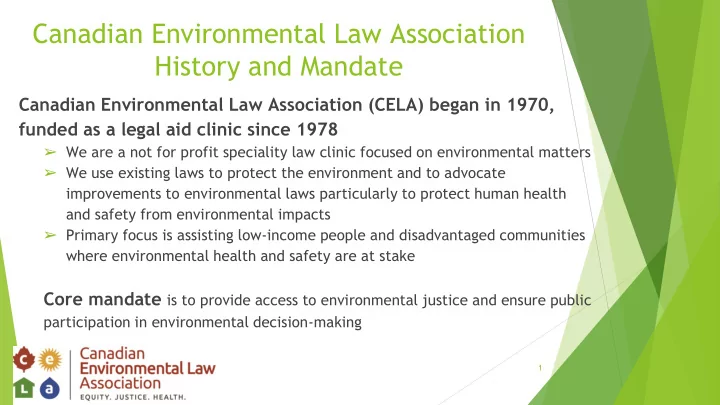

Canadian Environmental Law Association History and Mandate Canadian Environmental Law Association (CELA) began in 1970, funded as a legal aid clinic since 1978 ➢ We are a not for profit speciality law clinic focused on environmental matters ➢ We use existing laws to protect the environment and to advocate improvements to environmental laws particularly to protect human health and safety from environmental impacts ➢ Primary focus is assisting low-income people and disadvantaged communities where environmental health and safety are at stake Core mandate is to provide access to environmental justice and ensure public participation in environmental decision-making 1
CELA’s Strategic Priorities 1. Access to Environmental Justice ► CELA places high priority on cases and law reform work aimed at ensuring access to environmental justice 2. Pollution Prevention and Public Health and Safety ► CELA places high priority on cases and law reform work aimed at ensuring safe, healthy and livable communities 2
Civil Society Engagement: Rationale for participation ► International Agreements and Policy Frameworks on Toxic Chemicals Management - Long and rich history of civil society engagement from Canada, examples: ► Basel Convention on the Control of Transboundary Movements of Hazardous Wastes and their Disposal ► Stockholm Convention on Persistent Organic Pollutants ► Strategic Approach on International Chemicals Management ► Minimata Convention on Mercury ► Relevance and Linkages to Canada’s domestic regulatory and programs on toxic chemicals ► Advance Global Efforts to Reduce Toxic Exposure through Preventative Approaches ► Implement prevention strategies with a focus on life cycle approach and substitution requirements, right to know regimes, 3 and effective public participation process related to toxic chemicals.
Civil Society Participation - Challenges and Opportunities Challenges for Effective Public Engagement on SAICM ► transparency and role of Canadian public stakeholders in Canada’s decision making framework on SAICM limited ► Resources for effective engagement limited (attendance and preparation for meetings) ► Communications related to SAICM goals and focus Opportunities for Civil Society ► Learn, share and contribute to the global negotiations to promote pollution preventative strategies emerging from Canada’s chemicals management programs and legislations. ► Collaborate with global partners on programs to achieve prevention and elimination strategies for toxic chemicals. Foster relationships with Canadian government departments on international initiatives. 4 ►
Recommend
More recommend